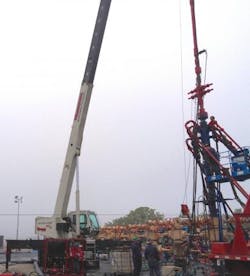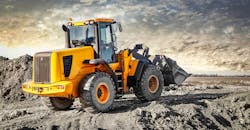On the Marcellus Shale natural gas fields in Pennsylvania, Levelland, Texas-based Renegade Wireline Services is using two National Crane boom trucks – an NBT45 and an NBT50 – to insert wireline cabling and related tools into several natural gas and oil well sites.
In the past, mast trucks handled a majority of work on gas and oil fields, but the work was cumbersome. Operators were forced to move their mast trucks for every lift, rigging and un-rigging the winch mechanisms each time. Now, crane operators are able to rig a boom truck for several lifts from the same spot, which is much more efficient, saving time and money.
Rodney Offield, manager of the Pittsburgh, Pa., branch of Renegade, says National Crane boom trucks are not only his “personal preference,” but that they are also essential to the company’s work.
“We need all the cranes we use on the gas and oil field to have at least 125 feet of main boom so that we can place tools into multiple wells without having to move the truck,” he said. “The cranes also have to have a high load rating at the boom tip to handle the intense weight of the multi-ton rigging and cable-hoisting operations.”
The NBT45 has a 45-ton capacity and a 127-foot, five-section full power boom. The NBT50 has a 50-ton capacity and a 128-foot, five-section full power boom. Both machines have the option of being equipped with shorter, four-section power booms, but the extra reach is crucial to Renegade’s workflow strategy.
Offield says that in the oil and gas business, jobs come suddenly and his company must react immediately. That means jumping in the boom truck and heading to a jobsite right away. Renegade doesn’t have to worry about obtaining last-minute highway permits because it uses National boom trucks that are mounted on chassis that comply with federal bridge laws.
“Bigger cranes are subject to federal size and weight laws in Pennsylvania – if we used truck cranes that had similar capabilities to these boom trucks or bigger cranes, we’d have to have a person in-office filing permits each time we wanted to cross state lines or drive over a bridge,” he said.
Additionally, Offield says boom trucks are not bound by overweight and permitting regulations that restrict the hours or days spent driving larger machines in Pennsylvania. For example, a larger crane may have to be parked on a job site from Saturday afternoon until Monday morning due to overweight and permitting regulations. However, National Crane boom trucks mounted on road-legal chassis that can be driven 24 hours a day, seven days a week.
“Often times, I get a call at 3:00 or 4:00 in the morning and we need to leave immediately,” Offield said. “If I didn’t use the NBTs, it would not only cost more time and money, but I could lose out on potential jobs.”
National Crane boom truck cranes are also making work on the job site more secure and helping to improve communication among crews. With many other trucks, the control levers are outside of the back window. Operators have to engage the clutch pedal, and then turn their bodies to sit sideways and operate the winch. In boom trucks, the controls are right in front of the operator.
This operator’s setup doesn’t just make lifts easier, it helps improve communication among crews. In mast trucks, the load could be in front, behind or on either side of the operator, causing visibility issues. In a National Crane boom truck, the load is directly in front of the operator, making it much easier to see. The better view makes the picking of loads less dangerous and allows the operator to have full eye contact with his ground crew.
“The boom trucks have made this kind of gas and oil field work much easier and give the operators a greater sense of security,” Offield said.
Although Renegade already owns two NBT45s, they are currently renting two additional boom trucks from Stephenson Equipment Inc., based out of Harrisburg, Pa., that are working at the Marcellus Shale sites. Both National Cranes are mounted on Peterbilt 367 trucks that are built to meet federal bridge regulation.
Stephenson is a 55 year-old company and an Elite dealer for Manitowoc Crane, selling, servicing and stocking parts for National Crane products and other Manitowoc products. Stephenson also offers crane rentals and crane training programs for operators taking the NCCCO certification programs in Pennsylvania and New York.
Gabe Lash, territory sales manager, says Stephenson has seen a shift from construction to natural gas and oilwell services over the last few years, and National Crane boom trucks have been at the center.
“We do really well with the National Crane and Manitowoc products. We’ve been investing in more National Crane NBTs to meet customer demands,” he said. “Boom trucks have become the standard for completion of work in gas and oil fields. The features of the NBT line and the factory support from Manitowoc that backs them have made the cranes indispensable to our fleet.”
Source: National Crane





